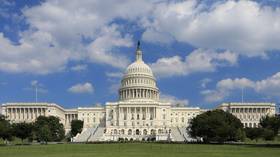US Congress passes bill to avoid government shutdown

The US House of Representatives has passed a temporary spending bill to avert a government shutdown, while lawmakers debate a larger funding package worth nearly $2 trillion. The Senate is expected to take up the measure later this week.
Congress approved the short-term funding in a 224-201 vote on Wednesday, with all Democrats in the chamber voting for the bill alongside nine Republicans, and the remaining House GOP members voting against.
The legislation will extend funding to December 23 and avoid a government shutdown, buying time as Congress negotiates the details of a $1.7-trillion spending bill for the coming year. While the two major parties continue to disagree over certain provisions, congressional negotiators announced that they had agreed on a broader framework for the bill on Tuesday, suggesting they may be on track for a deal before the government runs out of cash.
The Senate could vote on the temporary spending measure as early as Thursday, CNN reported, and President Joe Biden is expected to sign the bill when it reaches his desk.
Republicans opposing the short-term bill have argued that it would allow the larger spending package to pass just before the GOP is set to take control of the lower house of Congress. They had instead pressed to extend funding until January, when their party would have more leverage in negotiations, but ultimately lost out to the Democrats and a handful of dissenting Republicans.













